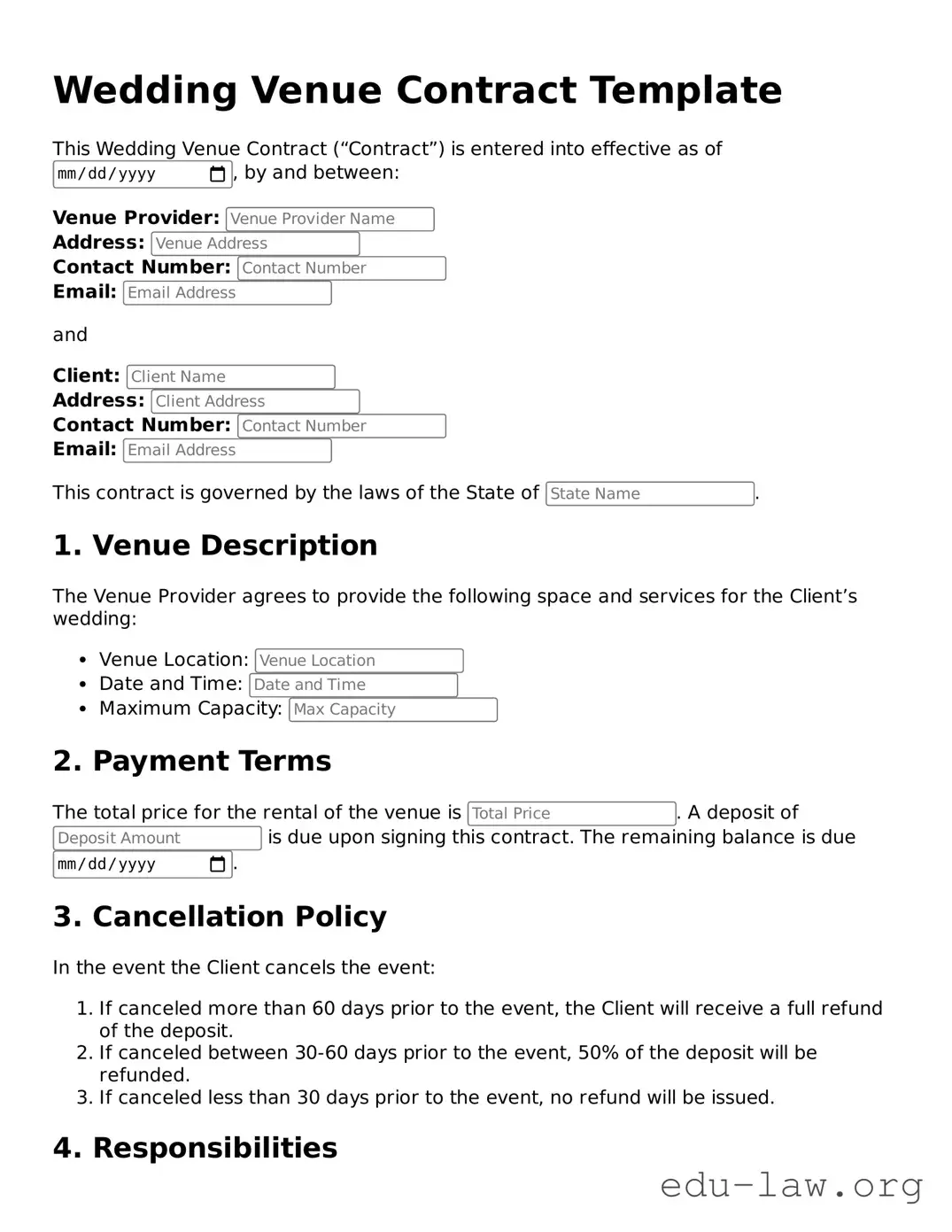What is a Wedding Venue Contract?
A Wedding Venue Contract is a legal document that outlines the terms and conditions between the couple and the venue hosting the wedding. It serves to protect both parties by detailing what is expected, what is provided, and the responsibilities of each party involved in the wedding ceremony and reception. This contract typically includes important information like payment schedules, cancellation policies, venue rules, and amenities offered.
Why is a Wedding Venue Contract important?
The contract is essential because it creates a clear understanding of the agreement between you and the venue. Without it, misunderstandings may arise regarding what is included in your rental or the responsibilities for the setup and cleanup of the space. The contract can help ensure that both parties are on the same page and can provide legal recourse if issues occur.
What should I look for in a Wedding Venue Contract?
When reviewing a contract, pay attention to several key elements: the total cost and payment schedule, any deposit requirements, cancellation policies, and the time frames for set up and cleanup. Also, check for any restrictions the venue may have, such as noise limits or decor restrictions, and confirm the availability of amenities like tables, chairs, and linens. Understanding these details can prevent potential conflicts.
What kind of fees can I expect in the contract?
In addition to the venue rental fee, be prepared for other possible charges. Common fees might include deposits to secure the date, service charges for staff assistance, cleaning fees, and costs for additional services such as catering or equipment rentals. Be sure to read the fine print about these fees to understand what you might be responsible for add-ons and hidden costs.
Can I make changes to the Wedding Venue Contract after signing it?
Changes to the contract may be possible, but they typically require agreement from both parties. If you need to alter details such as the date, guest count, or services provided, communicate directly with the venue as soon as possible. Many venues will have a process for amendments, but be aware that some changes might result in additional fees or affect your original terms.
What is the cancellation policy?
The cancellation policy outlines what happens if you have to cancel your wedding or the venue reservation. Most contracts will specify a timeline for cancellations and any associated fees. For example, canceling closer to the wedding date may result in the loss of your deposit. Make sure to identify these conditions early on so you understand your options in case of unforeseen circumstances.
What happens if the venue cancels our contract?
If the venue cancels your contract, they typically have an obligation to notify you immediately. A well-written contract will specify the steps the venue must take in this situation, often including a refund of any payments made. In some cases, venues may provide an alternative date or a different location to accommodate your event. Always inquire how the venue would handle such an event in the contract.
Are there restrictions on vendors I can use?
Some venues have specific requirements regarding the vendors you can hire for your wedding, such as caterers, decorators, or photographers. This is often due to insurance, safety, or catering guidelines. Review your contract carefully to understand if there are any preferred vendors you must use or if you’re allowed to bring in your own professionals. If limited, ask about any reasons for these restrictions and if exceptions can be made.
What should I do if I have questions about the contract?
If you have questions or concerns about the Wedding Venue Contract, it’s important to discuss them directly with the venue’s representative. They are usually willing to clarify terms or conditions that may seem unclear. It's advisable to have your questions answered before signing the contract and committing to any arrangements. Consulting with someone who has experience in wedding planning or law may also be helpful.
How can I protect myself when signing a Wedding Venue Contract?
To protect yourself, read the contract thoroughly and ensure you understand all parts before signing. Take notes on any areas that may need clarification. If you feel uncertain about specific terms, consider having someone you trust review it as well. Keeping copies of all correspondence and having everything in writing can also be beneficial should any disputes arise in the future.
